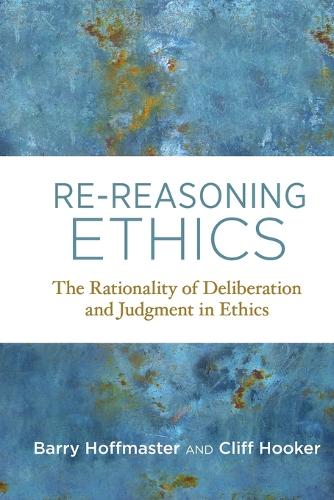
Re-Reasoning Ethics: The Rationality of Deliberation and Judgment in Ethics
(Paperback)
Publishing Details
Re-Reasoning Ethics: The Rationality of Deliberation and Judgment in Ethics
By (Author) Barry Hoffmaster
By (author) Cliff Hooker
MIT Press Ltd
MIT Press
31st October 2023
United States
Classifications
Professional and Scholarly
Non Fiction
Ethical issues, topics and debates
170
Physical Properties
Paperback
320
Width 152mm, Height 229mm
369g
Description
How developing a more expansive, non-formal conception of reason produces richer ethical understandings of human situations, explored and illustrated with many real examples. How developing a more expansive, non-formal conception of reason produces richer ethical understandings of human situations, explored and illustrated with many real examples. In Re-Reasoning Ethics, Barry Hoffmaster and Cliff Hooker enhance and empower ethics by adopting a non-formal paradigm of rational deliberation as intelligent problem-solving and a complementary non-formal paradigm of ethical deliberation as problem-solving design to promote human flourishing. The non-formal conception of reason produces broader and richer ethical understandings of human situations, not the simple, constrained depictions provided by moral theories and their logical applications in medical ethics and bioethics. Instead, it delivers and vindicates the moral judgment that complex, contextual, and dynamic situations require. Hoffmaster and Hooker demonstrate how this more expansive rationality operates with examples, first in science and then in ethics. Non-formal reason brings rationality not just to the empirical world of science but also to the empirical realities of human lives. Among the many real cases they present is that of how women at risk of having children with genetic conditions decide whether to try to become pregnant. These women do not apply the formal principle of maximizing expected utility (as advised by genetic counselors) and instead imagine scenarios of what their lives could be like with an affected child and assess whether they could accept the worst of these scenarios. Hoffmaster and Hooker explain how moral compromise and a liberated, extended, and enriched reflective equilibrium expand and augment rational ethical deliberation and how that deliberation can rationally design ethical practices, institutions, and policies.
Author Bio
Barry Hoffmaster, a bioethicist, is Professor Emeritus of Philosophy at the University of Western Ontario. Cliff Hooker, a philosopher of science, is Professor Emeritus of Philosophy at the University of Newcastle, Australia.
